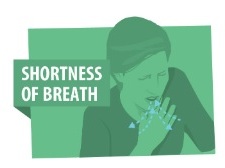Shortness of breath

Editor-In-Chief: Prab R Tumpati, MD
Obesity, Sleep & Internal medicine
Founder, WikiMD Wellnesspedia &
W8MD's medical weight loss NYC, sleep center NYC
Philadelphia medical weight loss and Philadelphia sleep clinics
| Shortness of breath | |
|---|---|

| |
| Synonyms | Dyspnea, breathlessness |
| Pronounce | N/A |
| Specialty | N/A |
| Symptoms | Difficulty breathing, feeling of suffocation |
| Complications | Respiratory failure, pneumonia, pulmonary embolism |
| Onset | Sudden or gradual |
| Duration | Varies |
| Types | N/A |
| Causes | Asthma, chronic obstructive pulmonary disease, heart failure, pneumonia, anxiety, anemia, pulmonary embolism |
| Risks | Smoking, obesity, allergies, sedentary lifestyle |
| Diagnosis | Physical examination, chest X-ray, spirometry, blood tests |
| Differential diagnosis | Heart attack, panic attack, pneumothorax, interstitial lung disease |
| Prevention | N/A |
| Treatment | Oxygen therapy, bronchodilators, steroids, antibiotics |
| Medication | Albuterol, prednisone, furosemide |
| Prognosis | N/A |
| Frequency | Common |
| Deaths | Varies depending on underlying cause |
Shortness of breath, medically referred to as dyspnea, is a sensation of not being able to get enough air. It can be a symptom of a variety of health conditions, ranging from mild temporary conditions to serious chronic diseases.
Causes[edit]
Shortness of breath can be caused by a wide range of conditions, including:
- Cardiovascular conditions: These include heart failure, coronary artery disease, and cardiac arrhythmias.
- Respiratory conditions: Conditions such as chronic obstructive pulmonary disease (COPD), asthma, pneumonia, pulmonary embolism, and lung cancer can lead to shortness of breath.
- Anemia: This condition, characterized by low red blood cell count, can result in inadequate oxygen delivery to tissues, causing dyspnea.
- Anxiety disorders: Shortness of breath can also be a symptom of anxiety or panic disorders.
- Obesity: Carrying excess weight can put extra strain on the respiratory system, leading to shortness of breath.
Diagnosis[edit]
Diagnosis typically involves a physical examination, a review of medical history, and various tests to determine the underlying cause. These tests may include:
- Chest X-ray or CT scan: These imaging tests can provide information about the heart and lungs.
- Electrocardiogram (ECG): This test records the electrical activity of the heart and can detect heart conditions that may be causing shortness of breath.
- Pulmonary function tests: These tests measure how well the lungs are working.
- Blood tests: These can help identify conditions such as anemia or infections.
- Echocardiogram: This test uses sound waves to create images of the heart, and can detect problems with heart function and structure.
Treatment[edit]
Treatment depends on the underlying cause of the shortness of breath. It may include medications, lifestyle changes, or in more severe cases, surgery.
See Also[edit]
|
|
|
| Signs and symptoms relating to the respiratory system | ||||||||||||||
|---|---|---|---|---|---|---|---|---|---|---|---|---|---|---|
|
Ad. Transform your life with W8MD's Budget GLP-1 injections from $49.99


W8MD offers a medical weight loss program to lose weight in Philadelphia. Our physician-supervised medical weight loss provides:
- Weight loss injections in NYC (generic and brand names):
- Zepbound / Mounjaro, Wegovy / Ozempic, Saxenda
- Most insurances accepted or discounted self-pay rates. We will obtain insurance prior authorizations if needed.
- Generic GLP1 weight loss injections from $49.99 for the starting dose of Semaglutide and $65.00 for Tirzepatide.
- Also offer prescription weight loss medications including Phentermine, Qsymia, Diethylpropion, Contrave etc.
NYC weight loss doctor appointmentsNYC weight loss doctor appointments
Start your NYC weight loss journey today at our NYC medical weight loss and Philadelphia medical weight loss clinics.
- Call 718-946-5500 to lose weight in NYC or for medical weight loss in Philadelphia 215-676-2334.
- Tags:NYC medical weight loss, Philadelphia lose weight Zepbound NYC, Budget GLP1 weight loss injections, Wegovy Philadelphia, Wegovy NYC, Philadelphia medical weight loss, Brookly weight loss and Wegovy NYC
|
WikiMD's Wellness Encyclopedia |
| Let Food Be Thy Medicine Medicine Thy Food - Hippocrates |
Medical Disclaimer: WikiMD is not a substitute for professional medical advice. The information on WikiMD is provided as an information resource only, may be incorrect, outdated or misleading, and is not to be used or relied on for any diagnostic or treatment purposes. Please consult your health care provider before making any healthcare decisions or for guidance about a specific medical condition. WikiMD expressly disclaims responsibility, and shall have no liability, for any damages, loss, injury, or liability whatsoever suffered as a result of your reliance on the information contained in this site. By visiting this site you agree to the foregoing terms and conditions, which may from time to time be changed or supplemented by WikiMD. If you do not agree to the foregoing terms and conditions, you should not enter or use this site. See full disclaimer.
Credits:Most images are courtesy of Wikimedia commons, and templates, categories Wikipedia, licensed under CC BY SA or similar.
Translate this page: - East Asian
中文,
日本,
한국어,
South Asian
हिन्दी,
தமிழ்,
తెలుగు,
Urdu,
ಕನ್ನಡ,
Southeast Asian
Indonesian,
Vietnamese,
Thai,
မြန်မာဘာသာ,
বাংলা
European
español,
Deutsch,
français,
Greek,
português do Brasil,
polski,
română,
русский,
Nederlands,
norsk,
svenska,
suomi,
Italian
Middle Eastern & African
عربى,
Turkish,
Persian,
Hebrew,
Afrikaans,
isiZulu,
Kiswahili,
Other
Bulgarian,
Hungarian,
Czech,
Swedish,
മലയാളം,
मराठी,
ਪੰਜਾਬੀ,
ગુજરાતી,
Portuguese,
Ukrainian


